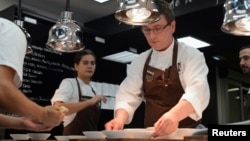They have already earned a place in the firmament of the world's best chefs. Now Basque chef Andoni Luis Aduriz and Mexico's Enrique Olvera have set their sights on one of the world's toughest markets: communist-run Cuba.
The island has seen a restaurant boom in recent years, fed by market-style reforms enacted under President Raul Castro, though ingredients can be scarce.
The pair are eager to take on the challenge.
Aduriz's restaurant Mugaritz, in Spain's northern Basque region, was named the sixth best restaurant in the world this year by Restaurant Magazine, while Olvera's Pujol in Mexico City ranked at No. 20.
“We're at a stage where we don't just want to cook good, creative, avant-garde food,” Aduriz told Reuters by telephone as he prepared dinner with Olvera at Pujol on Wednesday. “Why not do a project that aspires to be on a hypothetical list of the most fun restaurants in the world?”
Since 2011, restaurateurs in Cuba, who previously were limited to 12-seat establishments in their homes, can seat up to 50 people in rented spaces.
While state restaurants and joint ventures with the state can import luxury items, Cuba's private restaurants, known as paladares, often struggle to find ingredients from supermarkets and other retailers.
In keeping with Cuba's communist ideals, Aduriz and Olvera aim to create a restaurant that levels the social playing field.
“Gastronomy is not a privilege of people with money, but rather of intelligent people. Why not dream of a restaurant in which we manage to mix all social classes of people and no one asks who anyone else is,” Adruriz said.
It is not clear how economically viable the planned restaurant would be. The pair are still at the early stages, with no planned start-up date.
Havana's dining choices now include inventive fusion spots, ethnic choices offering Spanish, Italian or Russian food, and white-tablecloth restaurants serving haute cuisine.
They serve tourists, foreigners including diplomats, and a growing number of Cubans who have access to hard currency from their jobs, small businesses or relatives working abroad.
“We are going through the beginnings of something that didn't exist a short time ago,” said Pilar Fernandez, who opened her second restaurant, Casa Pilar, in Havana a month ago.
“This is going to create a new school in the world of Cuban gastronomy. With time, all these young people learning new skills will end up being good chefs.”





